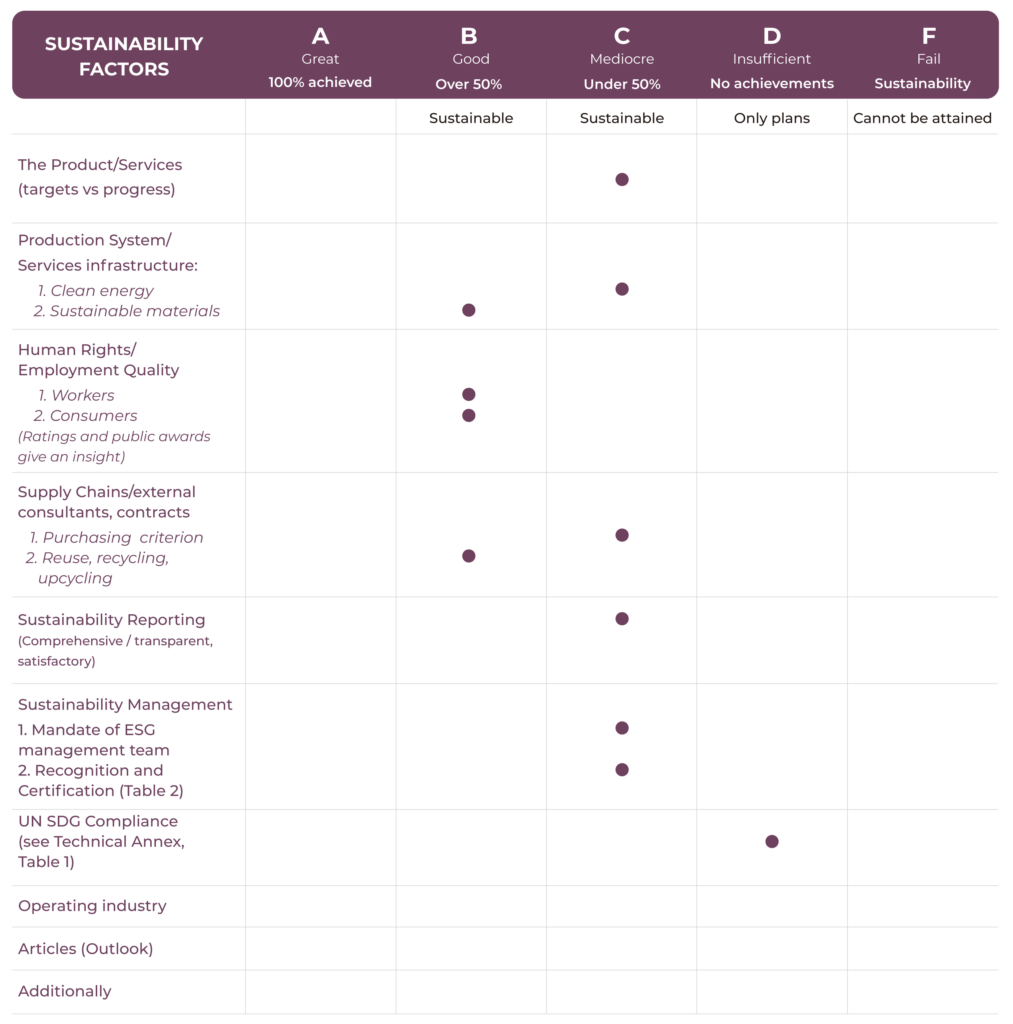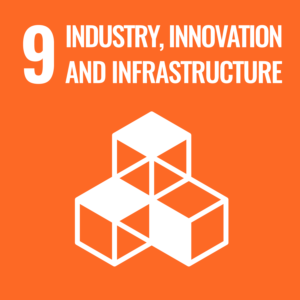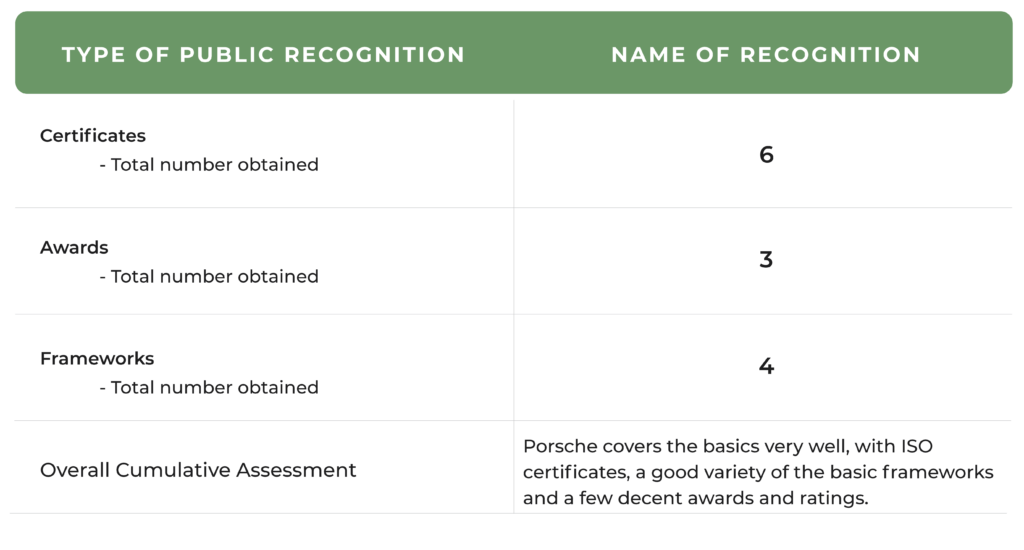
RATING

Negative
SECTOR
Automotive
Chief Sustainability Officer
Stock Exchange and Ticker
FWB: P911
Website
Contact
Tel: +44 3457 911 911 | E.mail: contact@porsche.co.uk
Listing
–
Awards
- ISS ESG rating: B-
- Sustainalytics rating: 21.6 (medium risk)
- Women Career Index – ranked second in the index & named newcomer of the year
Revenue
€33.138 billion
Market Capitalisation
€7.83 billion
Employees
36,996
Content source
Porsche Sustainability Report
Evaluation of Porsche
With its 2030 Sustainability Strategy, Porsche has set some targets for decarbonisation, circular economy, diversity, societal partnership, supply chain responsibility, government and transparency. Unfortunately, its progress toward its goals is difficult to track. Porsche, on the other hand, covers the fundamentals very well, with ISO certifications, a wide range of fundamental frameworks, and a few respectable awards and ratings.
The primary goal of Porsche’s sustainability strategy is for the company to continuously reduce its negative environmental impact while increasing its positive social impact. With its innovative solutions to various environmental problems and its investments for these solutions, it is most likely to see clear and better progress in the coming years, as also some of them are what appear first on the third party news about Porsche. Therefore the overall score is C, with a negative outlook, for the current lack of traceable and measurable progress reporting and the gap between current state of production and targeted progresses.
Sustainability Scorecard

Porsche Company Activity
Porsche is a German automobile manufacturer specialising in high-performance sports cars, SUVs and sedans, headquartered in Stuttgart, Baden-Württemberg, Germany. The company is owned by Volkswagen AG, a controlling stake of which is owned by Porsche Automobil Holding SE. Porsche’s current lineup includes the 718 Boxster/Cayman, 911 (992), Panamera, Macan, Cayenne and Taycan.
Porsche Sustainability Activity - As per company declarations
Porsche has earmarked their sustainability journey under their ‘2030 Sustainability Strategy’ which focuses on Decarbonisation, Circular economy, Diversity, Supply chain responsibility, and Governance and transparency. Porsche has made substantial changes to their supply chain to make it more responsible, in line with SDG 12 – Responsible Consumption & Production, such as their plan to spend €15 billion on electromobility, digital transformation and sustainable production up to 2025.
Certificate & Labels, Standards and Frameworks
- ISO 14001: Environmental Management and Responsibility
- ISO 14040/44: life cycle assessment (LCA) studies and life cycle inventory (LCI) studies.
- ISO 50001: Energy Management and Efficiency
- German Sustainable Building Council (DGNB) – Gold
- LEED gold certification for the Porsche Technical Training Centre in Shanghai and the One Porsche Drive North American headquarters in Atlanta
- BREEAM Excellent rating for the Porsche trade and service centre in West London
- Climate Bonds Initiative (CBI) Clean Transportation certification
Porsche in the news: Press Reviews and Social Media
Vroom! Porsche Accelerates Investments in Solar Power – Kaye, 18th August 2022
Porsche will invest in a solar power installation — in the form of a sizable microgrid that will generate power for its expanding campus and will be connected to the wider power grid — at the company’s North American headquarters in Georgia. The company that Porsche has tasked with building the installation, Cherry Street Energy, says the solar array at the automaker’s campus will generate 2,050 megawatt hours (MWh) of clean electricity a year, or the equivalent of keeping the lights on at almost 200 homes annually.
Porsche to build Australian e-fuels plant in Tasmania, operational from mid-2026 – Kirby & Mulach, 8th July 2022
Porsche Australia stated in April 2022 that it intended to establish an e-fuel production facility on the island of Tasmania. The facility will be the nation’s first of its kind. The HIF (Highly Innovative Fuels) Tasmania Carbon Neutral eFuel Plant will be the name of the facility. It is scheduled to debut in 2026.
Targets vs Progress Reported
| Target | Results reported |
|---|---|
| by 2030, more than 80 per cent of the vehicles delivered are to be electric, either as hybrid or all-electric vehicles | |
| Important elements here are the reduction targets regarding energy, CO₂, waste, water and VOC per vehicle, which are to be reduced by 45 per cent between 2014 and 2025 | From 2014 to 2022 Porsche has: - Reduced the water consumption per vehicle of its own production activities by more than 16% - Reduced energy consumption of the production sites per vehicle by 40.6% - Reduced direct and indirect greenhouse gas emissions of the production sites per vehicle by 9,990% - VOC emissions of the production sites per vehicle by 69% |
| The company has earmarked 15 billion euros to be spent on electromobility, digital transformation and sustainable production up to 2025. Of this, more than 800 million euros a year will be spent on digitalisation. | - The Ferry Porsche Foundation provided a further 61 schools with digitalisation momentum in the form of a “digital boost” amounting to more than € 900,000 - The foundation trained a spotlight on the topic of digitalisation in schools with the second Ferry Porsche Challenge. Around 300 education institutions in Baden-Württemberg and Saxony entered with their digitalisation projects. Thirty-one schools were recognised and funded with a total of 1.2 million euros |
| The proportion of sustainable refinancing in the Automotive subgroup to reach 100% by 2030 | The proportion of sustainable refinancing in the Automotive subgroup is currently around 60% |
| Sustainability Strategy 2030 | |
| Decarbonisation - Porsche has set itself the goal of being balance-sheet CO₂-neutral across the entire value chain by 2030 | - The decarbonisation Index (DKI) has fallen by around 5% since the defined base year, 2019 - Reduced direct and indirect greenhouse gas emissions of the production sites per vehicle by 9,990% |
| Circular economy - Porsche has set itself the goal of significantly increasing the proportion of the verifiable secondary materials used in its vehicles by 2030. | |
| Diversity - Porsche has set itself the goal of quantifiably establishing diversity within the company by 2030 in terms of mixed teams The proportion of women at the first and second management levels below the Executive Board are to be increased to 20% and 18% respectively. | Currently 9.7% of the Excutive Board are female |
| Partner to society - Porsche has set itself the goal of achieving a quantifiable improvement in people’s circumstances through its social projects by 2030. | - Sustainable employer campaign - Porsche launched a digital employer branding campaign called Sustainable Career in 2021. This focuses on employees who are reducing the company’s environmental footprint in a variety of ways, driven by the shared vision and goal of making Porsche the most sustainable brand for exclusive and sporty mobility - Work-life balance - Porsche strives to ensure that its staff can achieve a work-life balance. Employees receive support from a wide variety of different measures and options. Local cooperation partners ensure that regular childcare places are available in nurseries close to the company’s sites |
| Supply chain responsibility - Porsche has set itself the goal of 90 per cent of its purchasing volume meeting its most stringent quality standards by 2030 | The degree of fulfilment in the year under review was 69 per cent.5. |
| Governance and transparency - Porsche has itself the goal of being rated a leading automotive company in the independent ISS ESG rating by 2030. | Porsche has improved upon their ISS ESG rating from a C+ in the previous year to aB– this year |
UN SDGs Compliance Analysis
Progress made toward SDG targets
As reported by Porsche

- Porsche is moving into the manufacture of high-performance battery cells through its investment in the Cellforce Group. The Cellforce Group is a joint venture between Porsche and Customcells GmbH. A planned production facility is scheduled to have an initial capacity of at least 100 MWh a year from the end of 2024. This equates to high-performance battery cells for some 1,000 vehicles.
- The company has earmarked 15 billion euros to be spent on electromobility, digital transformation and sustainable production up to 2025. Of this, more than 800 million euros a year will be spent on digitalisation.
- The second generation of electric vehicles, which will be rolled out shortly, will release around a quarter fewer carbon dioxide emissions over its life cycle than the first generation.
- In August 2019, with the refinancing of sustainable projects. The company is the first automobile manufacturer to date to offer a green Schuldschein (promissory note), with a volume of one billion euros. The refinanced project portfolio includes funds for the development of the all-electric Porsche Taycan and investments in modern, energy-efficient production buildings and facilities that will be used exclusively for manufacturing and developing battery-powered vehicles

- Helping refugee women gain employment – In autumn, a donation of 300,000 euros was used to create a three-year qualification and development programme which boosts the female participants’ independence and steers them into an independent career.

- Commercially available high-voltage battery repairs – the sports car manufacturer has pursued a holistic approach in the area of electric vehicles with high-voltage batteries since the first generation of hybrid models was rolled out in 2013. This approach covers everything – procurement, manufacturing, advisory services, sales, logistics and recycling.
- The company has earmarked 15 billion euros to be spent on electromobility, digital transformation and sustainable production up to 2025. Of this, more than 800 million euros a year will be spent on digitalisation.
- The contracted printing company is likewise certified in accordance with the FSC and PEFC sustainability standards. Mineral oil-free inks are used for printing and the energy used is 100 per cent renewable.
- Since July 2021, the sports car manufacturer has required its series suppliers to use renewable energies for the manufacture of Porsche components. This applies to all production material contracts awarded for new vehicle projects.
- Porsche Australia stated in April 2022 that it intended to establish an efuel production facility on the island of Tasmania. The facility will be the nation’s first of its kind. The HIF (Highly Innovative Fuels) Tasmania Carbon Neutral eFuel Plant will be the name of the facility.
Sustainability Certificates, Awards and Listings



